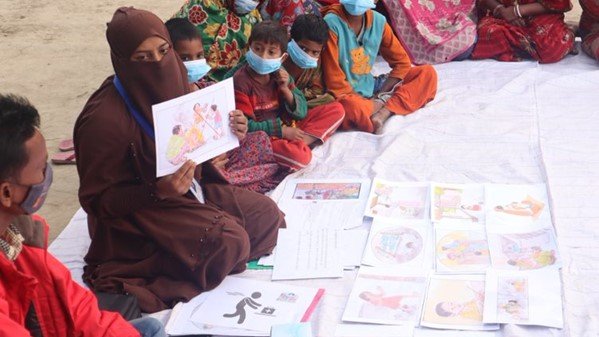3 children die every hour in Bangladesh from accidental injuries, including drowning, burns, electrocution and in road traffic.
These tragedies leave behind heartbreak and broken families. Our research has shown a lack of awareness of what causes injuries, along with a fatalistic attitude that injuries are inevitable, severely exacerbates the problems.
Women and Children First, with our partners BADAS-PCP and UCL, adapted community groups to address the issue. The findings show incredible potential for them to work.
The pilot project ran in 2 villages in Faridpur for 6 months. They tested if people would meet to learn about childhood injuries, discuss the causes and work together to develop solutions to address or mitigate them.
Over 500 parents came to the groups to learn what to do if a child is injured. More than half of these parents had children under 5 – the most vulnerable age group to both fatal and non-fatal injuries in Bangladesh.
Couples said, “Previously when someone was burned, people applied cold mud, raw egg, salt water or oil. Now we know the only remedy is to apply cold water for 10-15 minutes.”
Behaviours have started to change to prevent injuries. Parents ensure the ashes from cooking are cool. They stop children going near water. Children have been taught how to cross the road.
One couple said: “After attending the meetings, we installed sockets and switches higher, because my child wanted to touch them.”
A women’s group member added: “Much has been achieved. On the roads, the guardians are taking and bringing children holding their hands. They are careful now.”
Another benefit of this project is that parents have started to talk about dangers and injuries more within the community, something that was not commonly practiced before.
A mother said, “We have learned (about injury) and after coming home, have explained to neighbours too that we are doing a meeting and learning these things.”
The groups also aim to support each other through community income-generating activities.
Annemijn Sondaal, Programmes Manager, explains, “After attending these meetings, parents discussed building fences around ponds and wells to prevent drowning, but lack of money was a problem.
“To overcome this, they plan to set up a group saving fund or activities such as poultry farming or tailoring to save money which they could then spend on creating an injury risk free environment for the children.”
Additionally, with the generous support of the Austin Bailey Foundation, 30 group members received lifesaving First Responder training, which will provide up to 600 people access to trained First Aid support.
Annemijn adds, “This is so valuable. With health facilties being so far away, families would visit traditional healers rather than qualified healthcare providers. Their methods can exacerbate serious injuries, threatening the child’s life and long-term health.”
From the pilot, we gained valuable insights that community groups can bring people together to reduce childhood injuries. In the words of one male participant, “you cannot make the road safe alone.”
The groups felt with more time they would be able to go further and engage political representatives to help them implement community-wide solutions. A woman’s group member told us: “If there are local influential people, chair members and young people in every village, even a challenging task becomes easy.”
Women and Children First is continuing to test the community group approach for other health issues in rural areas. This includes our sexual health work through clinics in Kenya, using radio programming in Malawi, and trialing groups in Uganda to support those with disabilities.
In support of children, Women and Children First is adapting toys with health messaging in Ghana. These aim to inform parents and caregivers of the risks and danger signs that threaten children’s lives.
Such life-changing, life-saving impacts are made possible by our donors and supporters. Thank you.

